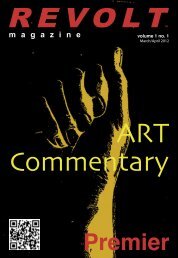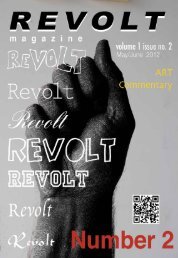Download PDF Version Revolt Magazine, Volume 1 Issue No.4
Download PDF Version Revolt Magazine, Volume 1 Issue No.4
Download PDF Version Revolt Magazine, Volume 1 Issue No.4
You also want an ePaper? Increase the reach of your titles
YUMPU automatically turns print PDFs into web optimized ePapers that Google loves.
2 Tha Beat Y’all When<br />
Hip Hop<br />
Pedagogy<br />
Goes BOOM!<br />
BY KATIE CERCONE<br />
Left to right: 1 BoomBoxBoy, New York City, 2012, photo courtesy of Melanie Mosier (pictured), 2 BoomBoxBoy, New York City, 2013, photo credit: Vito Fun, 3 BoomBoxBoy, New York City, 2013,<br />
photo credit: Brandon Stanton, 4 BoomBoxBoy, New York City, 2012, photo credit: Pascale M. Duthel.<br />
BoomBoxBoy and I were on the 2 train<br />
headed back from the Schomburg Center for<br />
Research in Black Culture. Over the course of<br />
the evening’s program Higher Learning: Using<br />
Hip Hop to Transform Schools and Communities 1<br />
(moderated by Hip Hop Scholar in residence<br />
Martha Diaz) I had wrenched out my wrist taking<br />
copious notes. BoomBoxBoy had lugged in his box<br />
midway through the evening wearing a zazzle brite<br />
black and magenta sweater and slept through<br />
a good third of the dialogue. When I asked him<br />
to talk about his BoomBoxBoy project for my Hip<br />
Hop Pedagogy article on the way home he said<br />
chuckling,<br />
“Hip hop pet a dawggy?”<br />
I’m not sure if he knew what I actually said<br />
or what pedagogy meant 2 exactly or not, or if that<br />
even matters. His rhetorical manipulation of my<br />
words - slyly signifying on my white privilege as he,<br />
a black man, *cutely* dismissed my intellectual<br />
jargoneering – well, that’s hip hop. As the poet<br />
Audre Lorde said, you don’t dismantle the master’s<br />
house using the master’s tools. Hip Hop is an<br />
African Diasporic artistry rooted partially in the<br />
musical lineages of the transatlantic slave trade,<br />
where slave songs talked about killing the master<br />
in coded language and used the drum beat to<br />
organize massive rebellions. During slavery reading<br />
could get you whipped and killed 3 .<br />
Numerous scholars have talked about how<br />
dance and the expressive use of the voice are a<br />
critique of the very idea of ownership. Today, we<br />
see and feel the widespread ramifications of our<br />
founding father’s strategic xenophobia in ways<br />
covert and unequivocal. We see the ultimate<br />
worship of the black male, or what many have<br />
termed ‘black male posturing,’ in Hip Hop and<br />
professional sports at the same time we see<br />
systematic societal neglect for the livelihood of<br />
black and latino youth en mass.<br />
As BoomBoxBoy (real name Prince Harvey)<br />
and his performative pet-a-dawggy can attest,<br />
Hip Hop as we progressive folk want to know it<br />
is alive and well. I’m here to extrapolate on the<br />
REVOLT<br />
BoomBoxBoy project as well as report just a few<br />
of the reasons Hip Hop is still meaningful, radical,<br />
and relevant in the New York City community and<br />
throughout the globe.<br />
For one, hip hop is boosting literacy rates<br />
across the country. According to Martha Diaz, who<br />
founded the Hip-Hop Education Center at NYU's<br />
Steinhardt School of Culture, Education, and<br />
Human Development, there is over 300 hip hop<br />
education courses and after school programs in<br />
the United States.Under the direction of Diaz, the<br />
Hip-Hop Education Center is developing a Teaching<br />
Certificate in collaboration with the New York<br />
University's Metro Center and Teachers College,<br />
Institute for Urban and Minority Education. They<br />
also have a Hip Hop Education guidebook you can<br />
download directly from their site. Afrika Bambaataa<br />
recently became the current Hip Hop Scholar in<br />
Residence at Cornel University. Jorge "PopMaster<br />
Fabel" Pabon, one of the earliest b-boys<br />
(“breakdancer” is not actually the correct terms<br />
says Pabon 4 ) teaches a cipher-style hip hop dance<br />
class and a hip hop history course at NYU. Today,<br />
Hip Hop is being disseminated in a manner which<br />
creates a generative space and leads youth toward<br />
the embrace of emancipatory knowledge.<br />
Although the formulaic raunch of<br />
commercial rap may reign supreme in the public<br />
eye, there remains the fact that throughout<br />
the world thousands of individuals are working<br />
collectively to go beyond beats and rhymes and<br />
expose the exponential social-emotional uplift that<br />
hip hop does.<br />
Scholars such as Dr. Ernest Morrell are<br />
highlighting the need for culturally appropriate<br />
curricula in the schools and articulating how hip<br />
hop can revolutionize education in America. As<br />
he addressed during the Schomburg panel, a<br />
key issue precipitating the 50% high school drop<br />
out rate for black males in this country is the<br />
fact that our schools still run on a Eurocentric<br />
model developed during the industrial revolution.<br />
Harkening back to the days when the education<br />
of slaves was made illegal in the United States,<br />
today black male youth have “wounded academic<br />
selves.” Bringing hip hop into schools is providing<br />
a space in the classroom setting in which they feel<br />
successful and motivated. Maintains Morrell, black<br />
male youth in particular are “logically disinvested<br />
from their institutions – it’s not pathological. The<br />
school system is abusive to young black males.”<br />
He sites the rhetorical power of language in hip<br />
hop and hip hop praxis - namely how hip hop<br />
has been at the forefront of every youth social<br />
justice movement globally for over 30 years - as<br />
living proof of how 4 decades after DJ Kool Herc<br />
inaugurated the first wave of hip hop the culture is<br />
still SPEAKING TRUTH TO POWER.<br />
Let’s not forget that beyond the culturally<br />
circumscribed Eurocentric model is the ancient<br />
African Diasporic wisdom from which hip hop<br />
sprung - Gulla abusive poems, Yoruba song<br />
contests, African American language rituals such<br />
as the dozens 5 , toasting, boasting and bragging. In<br />
societies of West Africa, a social outcast and pariah<br />
known as the “griot” is the cultural praise singer<br />
and oral historian. Explains Greg Tate, within the<br />
“wisdom of African cosmologies, these messengers<br />
are guaranteed freedom of speech in exchange<br />
for a marginality that extends to the grave.” 6 Fast<br />
forward to the supposedly caste-free democratic<br />
republic we call America, what will it take to upend<br />
the simultaneous worship and denigration of the<br />
rapper-contemporary-griot?<br />
Another Schomburg panelist and Hip Hop<br />
Educator, Dr. Yolanda Sealey-Ruiz, explained how<br />
hip hop is the core expression of black and latino<br />
males, “it is their fundamental language.” She is<br />
responsible for beyondthebricksproject.com, a<br />
grassroots community engagement media initiative<br />
promoting community based solutions to increase<br />
educational and social outcomes for school age<br />
black males. Another organization, called the<br />
Posse Foundation, has adopted the hip hop ethos<br />
of the “crew” aka “posse” to send promising<br />
high school students in groups of ten to college.<br />
Providing full scholarships to a 4-year school<br />
the Posse Foundation places teens from diverse<br />
backgrounds in supportive, multicultural peers<br />
groups. The organization’s founder Dr. Deborah<br />
Bial was recently awarded a MacArthur genius<br />
grant.<br />
<strong>Magazine</strong> Number 4, 2013 40





